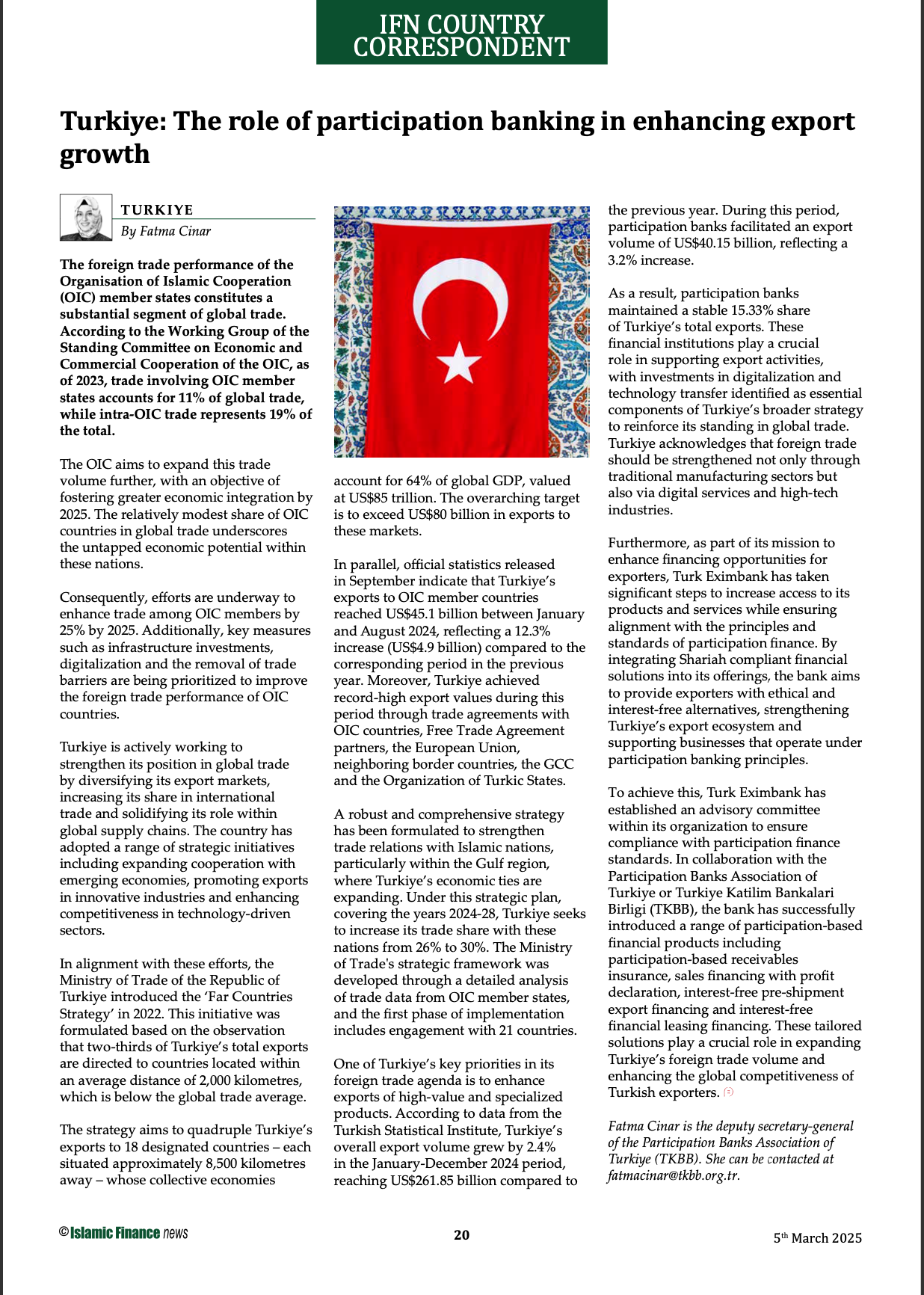By Fatma Cinar,
The foreign trade performance of the Organisation of Islamic Cooperation (OIC) member states constitutes a substantial segment of global trade. According to the Working Group of the Standing Committee on Economic and Commercial Cooperation (COMCEC) of the OIC, as of 2023, trade involving OIC member states accounts for 11% of global trade, while intra-OIC trade represents 19% of the total.
The OIC aims to expand this trade volume further, with an objective of fostering greater economic integration by 2025. The relatively modest share of OIC countries in global trade underscores the untapped economic potential within these nations.
Consequently, efforts are underway to enhance trade among OIC members by 25% by 2025. Additionally, key measures such as infrastructure investments, digitalisation, and the removal of trade barriers are being prioritised to improve the foreign trade performance of OIC countries.
Türkiye is actively working to strengthen its position in global trade by diversifying its export markets, increasing its share in international trade, and solidifying its role within global supply chains. The country has adopted a range of strategic initiatives, including expanding cooperation with emerging economies, promoting exports in innovative industries, and enhancing competitiveness in technology-driven sectors.
In alignment with these efforts, the Ministry of Trade of the Republic of Türkiye introduced the "Far Countries Strategy" in 2022. This initiative was formulated based on the observation that two-thirds of Türkiye’s total exports are directed to countries located within an average distance of 2,000 kilometres, which is below the global trade average.
The strategy aims to quadruple Türkiye’s exports to 18 designated countries—each situated approximately 8,500 kilometres away—whose collective economies account for 64% of global GDP, valued at $85 trillion. The overarching target is to exceed $80 billion in exports to these markets.
In parallel, official statistics released in September indicate that Türkiye’s exports to OIC member countries reached $45.1 billion between January and August 2024, reflecting a 12.3% increase ($4.9 billion) compared to the corresponding period in the previous year. Moreover, Türkiye achieved record-high export values during this period through trade agreements with OIC countries, Free Trade Agreement (FTA) partners, the European Union (EU-27), neighbouring border countries, the Gulf Cooperation Council (GCC), and the Organisation of Turkic States.
A robust and comprehensive strategy has been formulated to strengthen trade relations with Islamic nations, particularly within the Gulf region, where Türkiye’s economic ties are expanding. Under this strategic plan, covering the years 2024–2028, Türkiye seeks to increase its trade share with these nations from 26% to 30%. The Ministry of Trade's strategic framework was developed through a detailed analysis of trade data from OIC member states, and the first phase of implementation includes engagement with 21 countries.
One of Türkiye’s key priorities in its foreign trade agenda is to enhance exports of high-value and specialised products. According to data from the Turkish Statistical Institute (TÜİK), Türkiye’s overall export volume grew by 2.4% in the January–December 2024 period, reaching $261.85 billion compared to the previous year. During this period, participation banks facilitated an export volume of $40.15 billion, reflecting a 3.2% increase.
As a result, participation banks maintained a stable 15.33% share of Türkiye’s total exports. These financial institutions play a crucial role in supporting export activities, with investments in digitalisation and technology transfer identified as essential components of Türkiye’s broader strategy to reinforce its standing in global trade. Türkiye acknowledges that foreign trade should be strengthened not only through traditional manufacturing sectors but also via digital services and high-tech industries.
Furthermore, as part of its mission to enhance financing opportunities for exporters, Türk Eximbank has taken significant steps to increase access to its products and services while ensuring alignment with the principles and standards of participation finance. By integrating Sharia-compliant financial solutions into its offerings, the bank aims to provide exporters with ethical and interest-free alternatives, strengthening Türkiye’s export ecosystem and supporting businesses that operate under participation banking principles.
To achieve this, Türk Eximbank has established an Advisory Committee within its organization to ensure compliance with participation finance standards. In collaboration with the TKBB, the bank has successfully introduced a range of participation-based financial products, including participation-based receivables insurance, sales financing with profit declaration, interest-free pre-shipment export financing, and interest-free financial leasing financing. These tailored solutions plays a crucial role in expanding Türkiye’s foreign trade volume and enhancing the global competitiveness of Turkish exporters.
Fatma Cinar is the deputy secretary-general of the Participation Banks Association of Turkiye (TKBB). She can be contacted at fatmacinar@tkbb.org.tr.
This article was first published in IFN Volume 22 Issue 9 dated the 5th March 2025.
